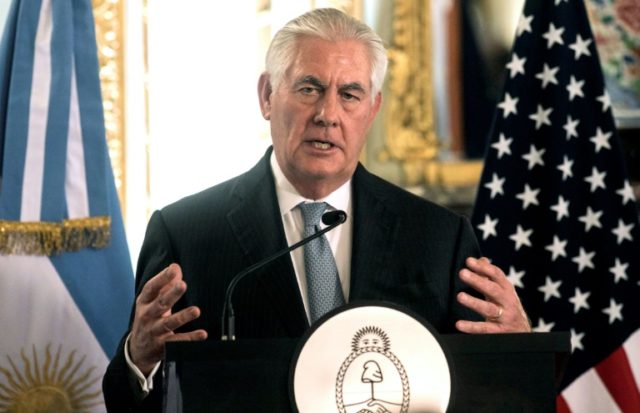Secretary of State Rex Tillerson has opened the possibility of the U.S. blocking imports of Venezuelan oil in an attempt to increase pressure on Nicolás Maduro’s ruling socialist dictatorship.
Tillerson made the remarks during a news conference in Buenos Aires amid his five-stop Latin American tour designed to promote the Trump administration’s foreign and domestic policy agenda.
“One of the aspects of considering sanctioning oil is, what effect would it have on the Venezuelan people?” Tillerson asked. “Is it a step that might bring this to an end more rapidly?”
“We are looking at options and we are looking at how to mitigate the impacts on U.S. business interests and on other countries in the region,” he continued.
Argentine Foreign Minister Jorge Faurie responded that his country would “closely follow” possible oil restrictions but added that sanctions “must never harm the Venezuelan people.”
“Not doing anything to bring this (crisis) to an end is also asking the Venezuelan people to suffer,” Tillerson said.
The U.S. has already imposed multiple sanctions on the Maduro regime banning Americans from dealing with Venezuela’s state-run oil company, as well as personal sanctions a number of high ranking government officials including Maduro himself.
However, many Latin American countries fear the additional sanctions could worsen the country’s unprecedented humanitarian crisis that has left millions of people starving and without basic resources to live. Hundreds of thousands of Venezuelans have already emigrated to neighboring countries such as Colombia and Brazil, who are now calling for greater international efforts to help ease the crisis.
Discussions on Venezuela remain the main priority of the Latin America tour, which includes stops in Peru, Colombia, and Jamaica, with Tillerson expected to push for increased regional pressure as the regime continues to weaken.
Last Thursday, Tillerson warned that the Venezuelan military could soon oust Maduro and manage a transition of power, following reports of devastatingly low morale as the regime fails to provide them with adequate food rations, leading to growing numbers of soldiers are deserting its ranks.
“In the history of Venezuela and in fact the history in other Latin American and South American countries, often times, it is the military that handles that,” he said during a speech the University of Texas. “When things are so bad that the military leadership realizes that it just can’t serve the citizens anymore, they will manage a peaceful transition.”
Follow Ben Kew on Facebook, on Twitter at @ben_kew, or email him at bkew@breitbart.com.

COMMENTS
Please let us know if you're having issues with commenting.